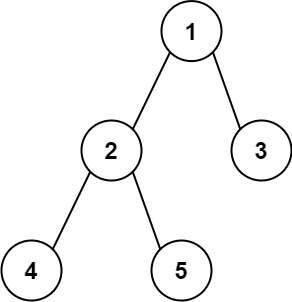Given the root of a binary tree, return the length of the diameter of the tree.
The diameter of a binary tree is the length of the longest path between any two nodes in a tree. This path may or may not pass through the root.
The length of a path between two nodes is represented by the number of edges between them.
Example 1:

Input: root = [1,2,3,4,5] Output: 3 Explanation: 3 is the length of the path [4,2,1,3] or [5,2,1,3].
Example 2:
Input: root = [1,2] Output: 1
Constraints:
- The number of nodes in the tree is in the range
[1, 104]. -100 <= Node.val <= 100
A:
利用C++ 的参数reference type, 来完成 多个 返回值
看helper( , int & maxDepth)
/**
* Definition for a binary tree node.
* struct TreeNode {
* int val;
* TreeNode *left;
* TreeNode *right;
* TreeNode() : val(0), left(nullptr), right(nullptr) {}
* TreeNode(int x) : val(x), left(nullptr), right(nullptr) {}
* TreeNode(int x, TreeNode *left, TreeNode *right) : val(x), left(left), right(right) {}
* };
*/
class Solution {
public:
int diameterOfBinaryTree(TreeNode* root) {
int maxDiameter = 0;
helper(root, maxDiameter);
return maxDiameter;
}
private:
int helper(TreeNode* root, int& maxVal) { // return depth of the tree
if (!root)
return 0;
int dl = helper(root->left, maxVal);
int dr = helper(root->right, maxVal);
if (dl + dr > maxVal) {
maxVal = dl + dr;
}
return 1 + max(dl, dr);
}
};
No comments:
Post a Comment